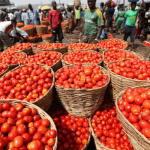The National Tomato Growers, Processors, and Marketers Association of Nigeria (NATPAN) has called on the federal government to take decisive steps to address post-harvest losses in the tomato sector. The Chairman of NATPAN’s Kaduna State chapter, Mr. Rabiu Zuntu, made this appeal during an interview in Lagos, highlighting the urgent need for government intervention to enhance the sector’s efficiency and growth.
Zuntu explained that smallholder farmers, who dominate the tomato industry, lack the financial capacity to invest in equipment and facilities necessary to reduce losses. He noted that government support in providing such resources could significantly minimize waste, boost value addition, and drive sectoral development.
One solution proposed by Zuntu is the use of plastic crates for transporting tomatoes, especially over long distances from northern Nigeria to other parts of the country. He emphasized that this method would drastically reduce damage during transportation and improve the quality of produce reaching markets.
To combat these challenges, NATPAN has initiated partnerships with existing and new processing facilities to help smallholder farmers reduce post-harvest losses through mechanization. Zuntu pointed out that the introduction of tomato processing machines would mitigate the annual glut experienced between January and February, ensuring better income for farmers and sectoral stability.
He also highlighted the role of solar dryers, introduced by some NGOs, in preserving tomatoes and extending their shelf life. While farmers have shown interest in this innovation, the high cost of solar dryers remains a barrier. To address this, the association is clustering farmers to pool resources, making the technology more accessible.
Zuntu stressed that with government support, these initiatives could be scaled up, ensuring sustainable growth for Nigeria’s tomato sector. He reiterated that reducing post-harvest losses not only enhances farmers’ incomes but also contributes to food security and the overall development of the agricultural sector.










